Kathy Acker
Kathy Acker
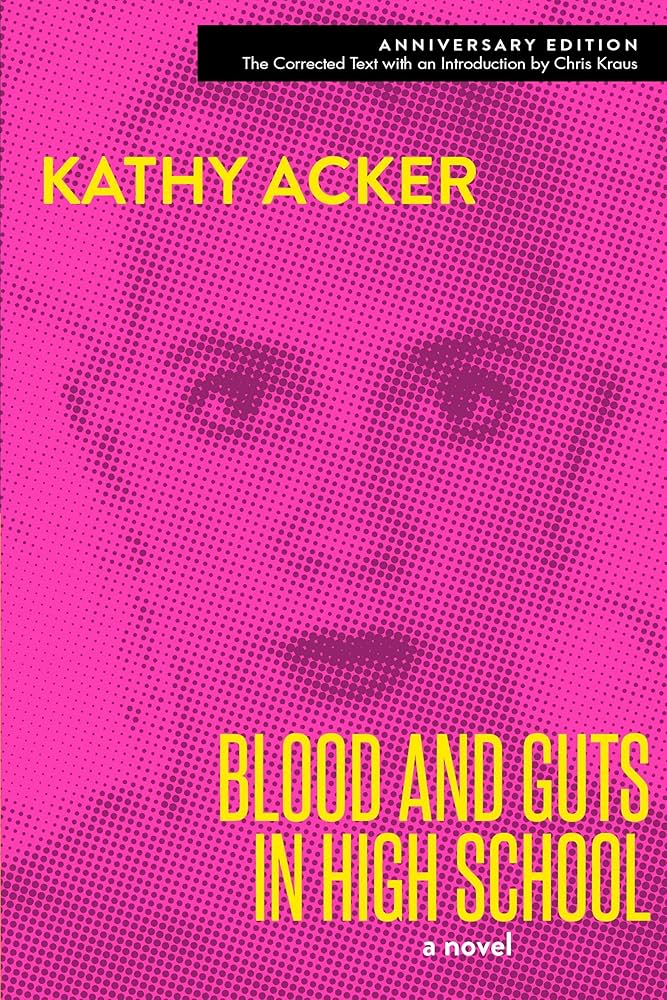
Blood and Guts in High School
A masterpiece of surrealist fiction, steeped in controversy upon its first publication in 1984, Blood and Guts in High School is the book that established Kathy Acker as the preeminent voice of post-punk feminism. With 2017 marking the 70th anniversary of her birth, as well as the 10th year since her death this transgressive work of philosophical, political, and sexual insight—with a new introduction by Chris Kraus—continues to become more relevant than ever before.
In the Mexican city of Merida, ten-year-old Janey lives with Johnny—her "boyfriend, brother, sister, money, amusement, and father"—until he leaves her for another woman. Bereft, Janey travels to New York City, plunging into an underworld of gangs and prostitution. After escaping imprisonment, she flees to Tangiers where she meets Jean Genet, and they begin a torrid affair that will lead Janey to her demise. Fantastical, sensual, and fearlessly radical, this hallucinatory collage is both a comic and tragic portrait of erotic awakening.
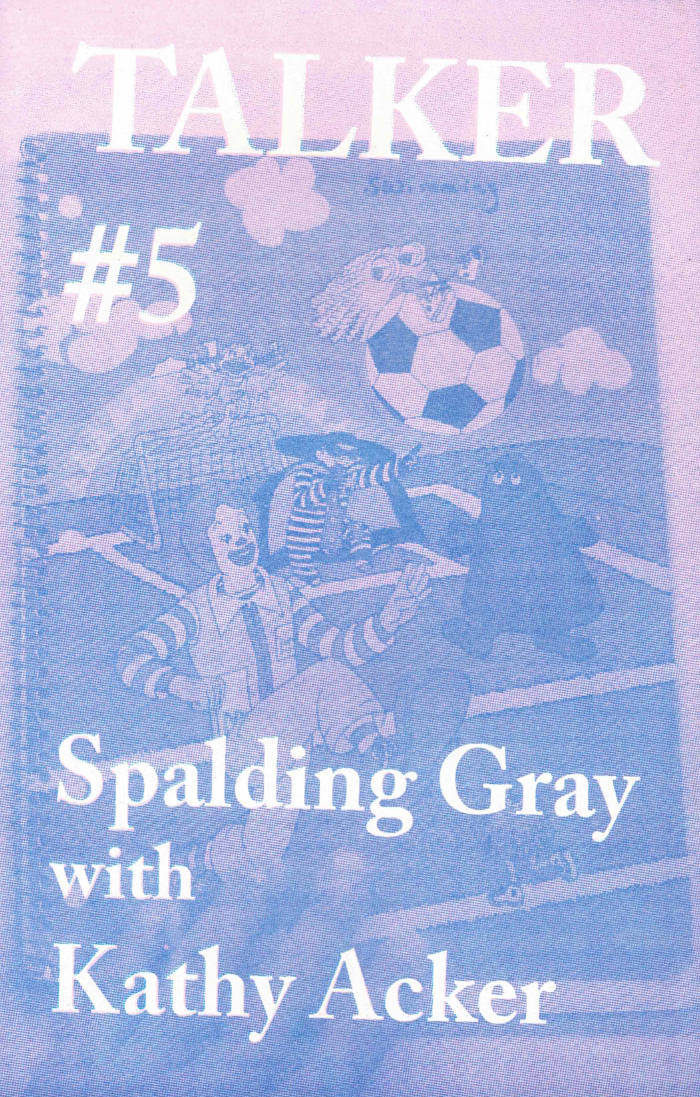
TALKER issue #5 — Spalding Gray with Kathy Acker
Talker is an interview zine about performance.
This is Issue #5. It is a transcript of an event hosted by the writer Kathy Acker at the ICA, London in February 1987 in which the performer Spalding Gray discussed his work.
A founding member of the Wooster Group, Spalding Gray gained fame for his autobiographical monologue performances. At the time of this conversation, he had just completed filming Jonathan Demme’s movie adaptation of his work Swimming to Cambodia, a performance in which he describes experiences surrounding a trip to Southeast Asia to play a small role in the film The Killing Fields (1984). In this dialogue with Acker, Gray focuses on the process of developing work and compares his experience of writing with making live performance.
The event was part of the ICA’s IN CONVERSATION series which paired up writers to talk about their practices.

Love, Emily (vinyl LP)
The restored and remastered vinyl reissue of a sound performance by American writer Kathy Acker and French noise/experimental band Nox, published in 1987, with a poster and a previously unpublished set of documents, letters, texts and photos.
Originally released in a long sold-out edition of 50 cassette tapes, Love, Emily (Acte 3) was the third and final album of Michel Henritzi's industrial label AKT Production. Recorded in a Paris studio in 1987, this 25-minute collage of spoken word and noise saturations intersects two radical voices from literature and experimental music of the time: American author Kathy Acker reading excerpts from her book My Death My Life by Pier Paolo Pasolini, and Nox, mainstay of the French noise and industrial scene. Pulled from oblivion, restored and remastered for vinyl by Slow Moves, this archive gem crosses the clashing worlds of poetry and industrial music, melding Acker's thought-provoking words to absolute and inflexible industrial sounds. A lot of it is noise, but a lot of it is also play; research for a new mystique, generating unusual forms and unknown languages.
Published in a limited edition of 400 copies, this vinyl also comes with a long printed panel of previously unpublished photographs and letters from Kathy Acker, tracing the background exchanges that led to the collaboration between the groundbreaking writer, Henritzi and Nox, a poster of Kathy Acker with French translations and a download code featuring both music and extra archival material (interview and articles).
With Kathy Acker (voice), Gerome Nox (percussion, guitars, vocals), Mikhail H (guitars).

Verlag der Buchhandlung Walther König
Get Rid Of Meaning
American author Kathy Acker was one of the most influential writers of the 20th century. Working through an experimental and avant-garde tradition, she wrote numerous novels, essays, poems, and novellas from the early 1970s to the late 1990s. As a postmodernist, plagiarist, and post-punk feminist, she continues to inspire generations of writers, philosophers, and artists. Get Rid of Meaning is the first comprehensive publication on Acker’s work from an artistic and literary perspective. It includes previously unpublished material from Acker’s personal archive and other collections. The publication is the compilation of a multipart research project including an exhibition and a symposium at Badischer Kunstverein in Karlsruhe.
With contributions from: Kathy Acker, Eleanor Antin, Dodie Bellamy, Hanjo Berressem, Ruth Buchanan, William S. Burroughs, Anja Casser, Georgina Colby, Leslie Dick, Claire Finch, Johnny Golding, Lynn Hershman Leeson, Anja Kirschner, Chris Kraus, Sylvère Lotringer, Douglas A. Martin, Jason McBride, Karolin Meunier & Kerstin Stakemeier, Avital Ronell, Carolee Schneemann, Daniel Schulz, Matias Viegener & McKenzie Wark.
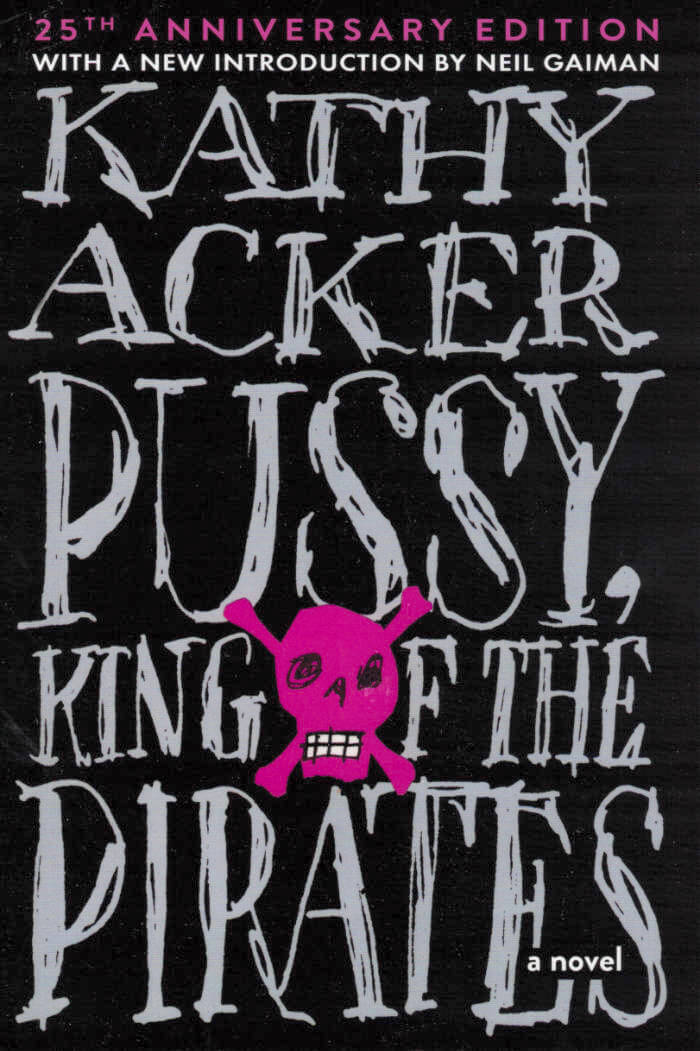
Pussy, King of the Pirates
Loosely related to Robert Louis Stevenson's classic Treasure Island, Pussy, King of the Pirates is a grrrl pirate story that journeys from the most famous whorehouse in Alexandria through an unidentified, crumbling city that may or may not be sometime in the future, to Brighton Town, England, and, finally, to a ship headed toward Pirate Island, where the stories converge and the vision ends.
Ransacking world history, literature, and language itself to speak to the current zeitgeist, Pussy, King of the Pirates is the literary analogue to the wild girl energy that dominates our rock and roll culture in the 1990s. A daring and passionate litany of disparate narratives and voices, poetry and prose, words and images, Kathy Acker's newest novel is perhaps her most subversive to date. Her meditations on love, sex, death, and art have made her a writer like no one else working today.
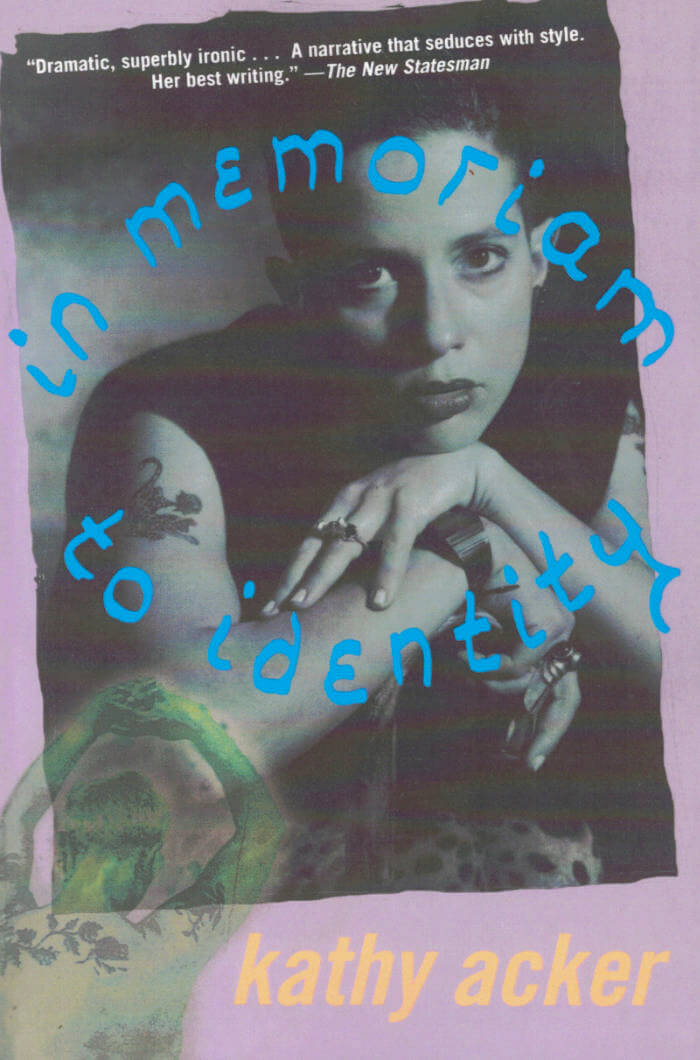
In Memoriam to Identity
In this characteristically sexy, daring, and hyperliterate novel, Kathy Acker interweaves the stories of three characters who share the same tragic flaw: a predilection for doomed, obsessive love. Rimbaud, the delinquent symbolist prodigy, is deserted by his lover Verlaine time and time again. Airplane takes a job dancing at Fun City, the seventh tier of the sex industry, in order to support her good-for-nothing boyfriend. And Capitol feels alive only when she's having sex with her brother, Quentin. In Memoriam to Identity is at once a revelatory addition to, and an irreverent critique of, the literature of decadence and self-destruction.

My Mother: Demonology
Based loosely on the relationship between Colette Peignot and Georges Bataille, My Mother: Demonology is the powerful story of a woman's struggle with the contradictory impulses for love and solitude. At the dawn of her adult life, Laure becomes involved in a passionate and all-consuming love affair with her companion, B. But this ultimately leaves her dissatisfied, as she acknowledges her need to establish an identity independent of her relationship with him. Yearning to better understand herself, Laure embarks on a journey of self-discovery, an odyssey that takes her into the territory of her past, into memories and fantasies of childhood, into wildness and witchcraft, into a world where the power of dreams can transcend the legacies of the past and confront the dilemmas of the present. With a poet's attention to the power of language and a keen sense of the dislocation that can occur when the narrative encompasses violence and pornography, as well as the traumas of childhood memory, Kathy Acker here takes another major step toward establishing her vision of a new literary aesthetic.
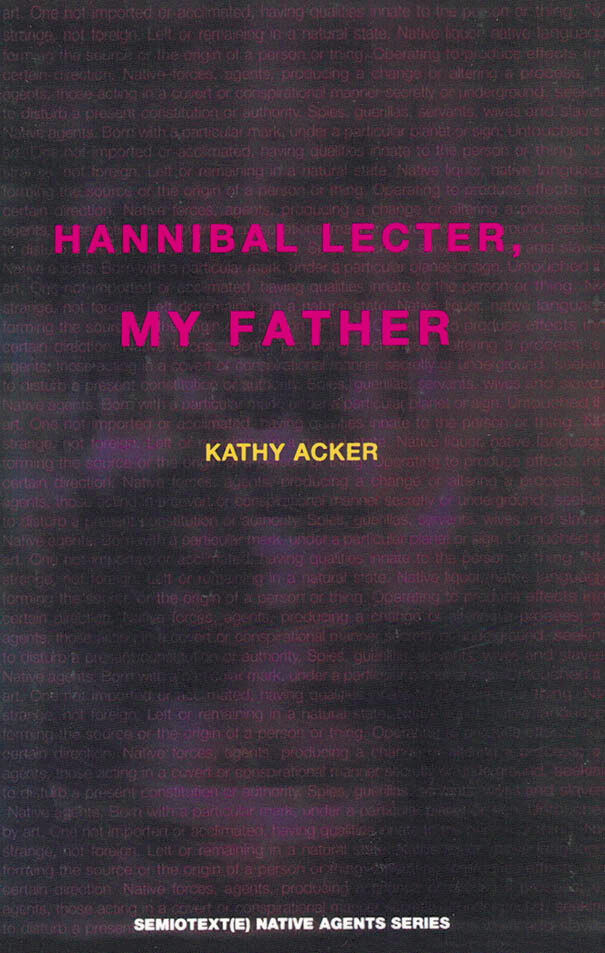
Hannibal Lecter, My Father
A collection of early and not-so-early work by the mistress of gut-level fiction-making.
You can say I write stories with sex and violence and therefore my writing isn't worth considering because it uses content much less lots of content. Well, I tell you this: 'Prickly race, who know nothing except how to eat out your hearts with envy, you don't eat cunt'...
Edited by Sylvere Lotringer and published in 1991, this handy, pocket-sized collection of some early and not-so-early work by the mistress of gut-level fiction-making, Hannibal Lecter, My Father gathers together Acker's raw, brilliant, emotional and cerebral texts from 1970s, including the self-published 'zines written under the nom-de-plume, The Black Tarantula.
This volume features, among others, the full text of Acker's opera, The Birth of the Poet, produced at Brooklyn Academy of Music in 1985, Algeria, 1979 and fragments of Politics, written at the age of 21. Also included is the longest and definitive interview Acker ever gave over two years: a chatty, intriguing and delightfully self-deprecating conversation with Semiotext(e) editor Sylvere Lotringer—which is trippy enough in itself as Lotringer, besides being a real person, has appeared as a character in Acker's fiction. And last, but not least, is the full transcript of the decision reached by West Germany's Federal Inspection Office for Publications Harmful to Minors in which Acker's work was judged to be not only youth-threatening but also dangerous to adults, and subsequently banned.
Acker is the sort of the writer that should be read first at 16, so that you can spend the rest of your life trying to figure her out; she confuses, infuriates, perplexes and then all of a sudden the writing seems to be in your bloodstream, like some kind of benign virus. She's definitely not for the easily offended—but then, there are worse things in life than being offended. Such as the things that Acker writes about...
Kathy Acker was a novelist, essayist and performance artist whose books include Blood and Guts in High School, The Childlike Life of the Black Tarantula, Empire of the Senseless, In Memoriam to Identity, Don Quixote, My Mother: Demonology, and her last novel, Pussy King of the Pirates. Born and raised on New York's Upper East Side, she died of breast cancer in Tijuana, Mexico, in 1997.
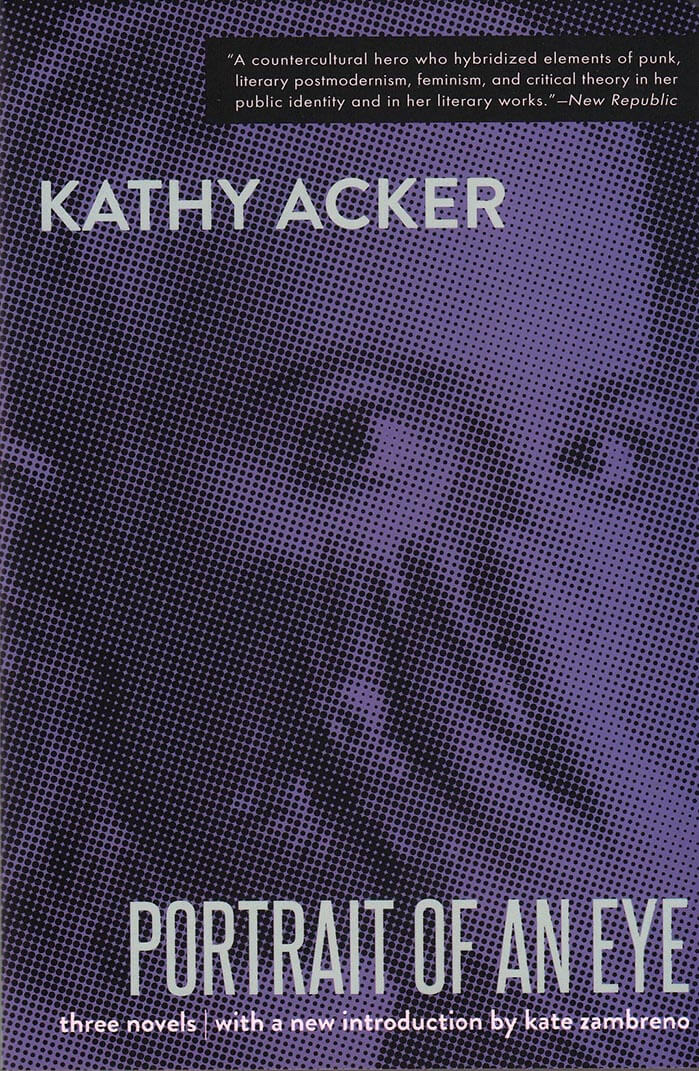
Portrait of an Eye
Three early, self-published novels from Kathy Acker reissued with an original introduction by Kate Zambreno, the author of Heroines, Green Girl, Screen Tests, and more.
The Childlike Life of the Black Tarantula, Kathy Acker's debut and the first in this three-novel collection, began as an episodic handmade pamphlet that Acker mailed out to influential writers and artists whose addresses she managed to get her hands on. In the novel, Acker steps into the biography of a Mississippi murderess who falls in love with a famous lawyer, and mixes in fragments from porn, historical romance, pulp fictions, and The Story of O. Collect with her second novel, the dreamy exploration of desire I Dreamt I was a Nymphomaniac, and her third, The Adult Life of Toulouse Lautrec, Portrait of an Eye is dive into the frenzy of sexual wanting, the search for identity, and the invention of a new literary language.
Now with an introduction by Kate Zambreno contextualizing the resurrection of these three early Acker novels, this new edition of Portrait of an Eye reminds us of all there is still to learn from Kathy Acker, a writer and artist whose work "remains radical and uncanny, entirely inimitable, a smash and grab on the history of literature" (Guardian).

Empire of the Senseless
Originally published in 1988, Empire of the Senseless marked a turning point in Acker's wild, inimitable style. Considered one of her more accessible works, here Acker candidly addresses her lifelong obsessions: childhood and trauma, language and sexuality, criminality and corruption, oppression and rebellion.
Abhor (part human, part robot) and her lover Thivai (a pirate) traverse Paris in a dystopian future, in search of a mysterious drug that Thivai needs in order to maintain his ability to love. Navigating the chaotic city, they encounter mad doctors, prisoners, bikers, sailors, tattooists, terrorists, and prostitutes, while a band of Algerian revolutionaries take over, and the C.I.A. plots to thwart them all.
Sexually explicit, graphically violent, Empire of the Senseless resists the desensitizing of cultural consciousness and the disintegration of interpersonal communication. A timeless, prescient parable, it speaks profoundly to our social and political history as well as our present reality.
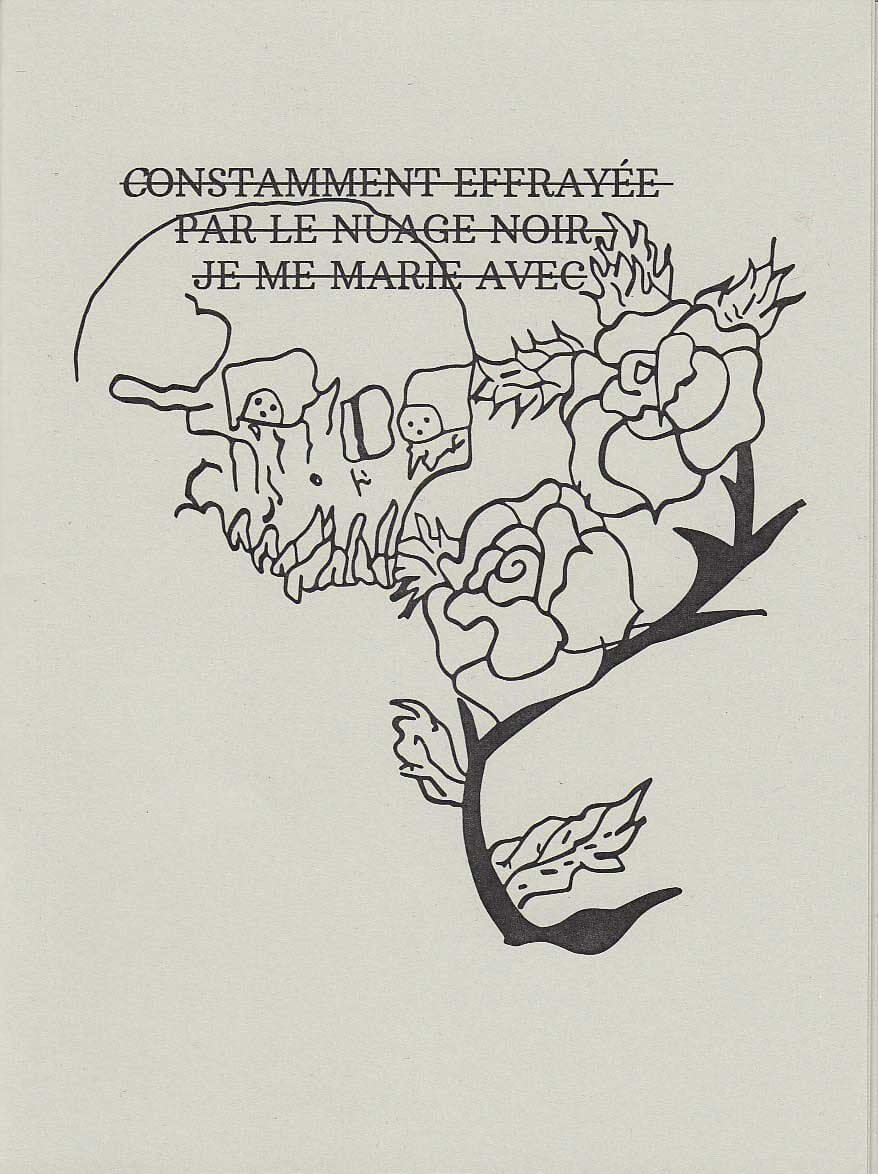
Constamment effrayée par le nuage noir je me marie avec
Quelques textes de Kathy Acker, écrits avant ses trente ans, traduits par Elodie Petit et Claire Finch.

Spread Wide
Rebecca Stevens, John Cussans and 2 more
Various artists and authors use two writers' correspondence as a primary source to develop an artistic and literary falsification. In this collaborative volume, the writer and artist Paul Buck works with the late 29 Kathy Acker. Using as source the raw materials of their correspondence from the early Eighties, a period when Acker was writing Great Expectations and trying to leave America for London, Buck confronts issues of appropriation, sampling, and plagiarism, relevant then and now.
Further encounters are triggered by writer Rebecca Stephens, artist John Cussans... and playwright Richard Foreman, artist Susan Hiller, musician David Coulter. Kathy Acker (1947-1997) was at the forefront of transgressive writing from the Seventies until her death. Her provocative intertextual narratives—halfway between autobiography and pornography—were developed in lectures, performances and films (Variety, Bette Gordon).
Her published work includes Blood and Guts in High School (1984), Don Quixote (1986), and Empire of the Senseless (1988). Rebecca Stephens escaped the chains of theology teaching to write on Saints and Courtesans, subjects on which books are in the pipeline.
John Cussans is a writer, artist and researcher who has exhibited regularly in London, Berlin, Slovenia, Vienna, Vancouver. In 2001 he founded The Bughouse, an art-event generator inspired by the work of Philip K. Dick. Paul Buck (born 1942, United Kingdom) is a British poet, performer and author of more than fifty crime novels. He has been challenging notions of writing, narrative, and the limits of the feasible since the late Sixties in books like The Honeymoon Killers, Violations and Lust, Walking into Myself... Chief editor of Curtains magazine, he introduced many French authors to the English audience.
And more
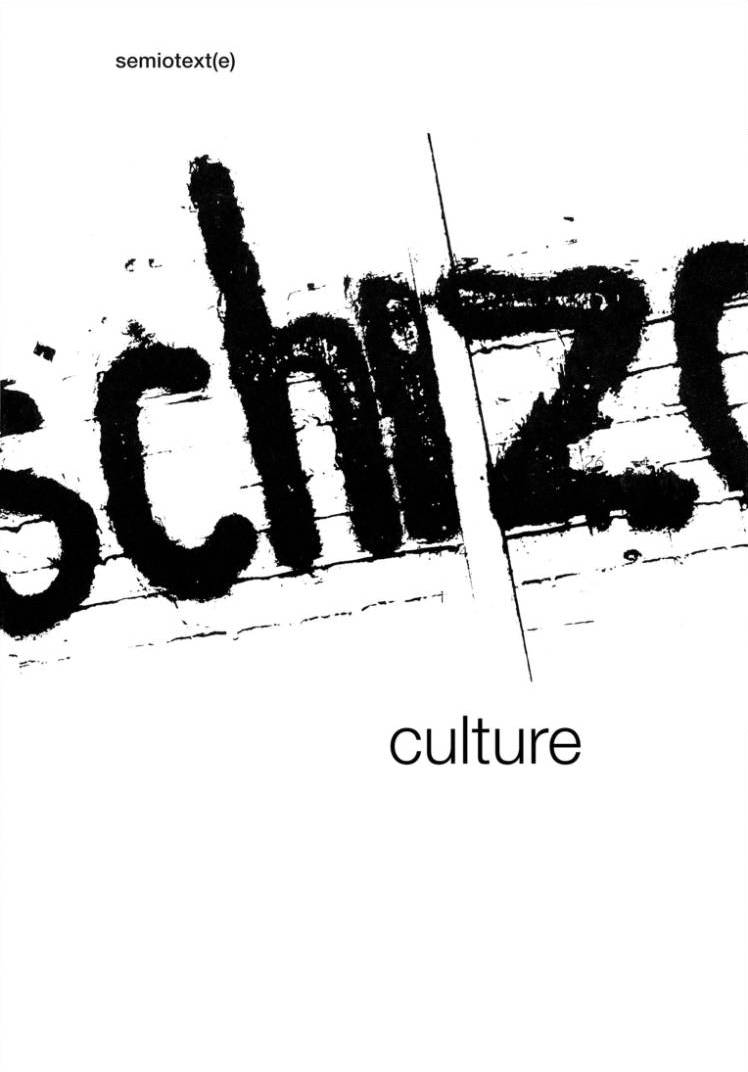
Schizo-Culture: The Event, The Book
Sylvère Lotringer, David Morris
The legendary 1975 "Schizo-Culture" conference, conceived by the early Semiotext(e) collective, began as an attempt to introduce the then-unknown radical philosophies of post-'68 France to the American avant-garde. The event featured a series of seminal papers, from Deleuze's first presentation of the concept of the "rhizome" to Foucault's introduction of his History of Sexuality project. The conference was equally important on a political level, and brought together a diverse group of activists, thinkers, patients, and ex-cons in order to address the challenge of penal and psychiatric institutions. The combination proved to be explosive, but amid the fighting and confusion "Schizo-Culture" revealed deep ruptures in left politics, French thought, and American culture.
The "Schizo-Culture" issue of the Semiotext(e) journal came three years later. Designed by a group of artists and filmmakers including Kathryn Bigelow and Denise Green, it documented the chaotic creativity of an emerging downtown New York scene, and offered interviews with artists, theorists, writers, and No Wave and pre-punk musicians together with new texts from Deleuze, Foucault, R. D. Laing, and other conference participants.
This slip-cased edition includes The Book: 1978, a facsimile reproduction of the original Schizo-Culture publication; and The Event: 1975, a previously unpublished and comprehensive record of the conference that set it all off. It assembles many previously unpublished texts, including a detailed selection of interviews reconstructing the events, and features Félix Guattari, William Burroughs, Kathy Acker, Michel Foucault, Sylvère Lotringer, Guy Hocquenghem, Gilles Deleuze, John Rajchman, Robert Wilson, Joel Kovel, Jack Smith, Jean-François Lyotard, Ti-Grace Atkinson, François Peraldi, and John Cage.

Acker
A lyric essay written through Kathy Acker's evocative prose, public statements, and private archives.
A cover of Kathy Acker’s career and a study of the development of narrative in her books deftly tracing Acker’s interactions with a diverse palette of avant-gardisms, world letters, cultures, and theory. Martin follows Acker through New York’s downtown St. Mark’s Poetry Project scene, Black Mountain College, and the Beats, as Acker embarks on her own deconstructions of subjects autobiographical and historical, art procedurals, proto-conceptual writing, legacies, and spirits.

Impossible Princess
Impossible Princess is the third collection of gay short fiction by PEN Award–winning San Francisco–based author Kevin Killian. A member of the “new narrative” circle including Dennis Cooper and Kathy Acker, Killian is a master short story writer, crafting campy and edgy tales that explore the humor and darkness of desire. A former director of Small Press Traffic and a co-editor of Mirage/Periodical, Killian co-wrote Jack Spicer’s biography, Poet Be Like God, and co-edited three Spicer books, including My Vocabulary Did This To Me: Collected Poems. His latest book, Action Kylie, is a collection of poems devoted to Kylie Minogue.

Dysphoria Mundi: A Diary of Planetary Transition
A revolutionary book tracing the collapse of the paradigms that have organized the world for centuries.
In Dysphoria Mundi, Paul B. Preciado, best known for his 2013 cult classic Testo Junkie, has written a mutant text assembled from essays, philosophy, poetry, and autofiction that captures a moment of profound change and possibility. Rooted in the isolation of the COVID-19 pandemic, and taking account of the societal convulsions that have ensued, Preciado tries to make sense of our times from within the swirl of a revolutionary present moment.
The central thesis of this monumental work is that dysphoria, to be understood properly, should not be seen as a mental illness but rather as the condition that defines our times. Dysphoria is an abyss that separates a patriarchal, colonial, and capitalist order hurtling toward its end from a new way of being that, until now, has been seen as unproductive and abnormal but is in fact the way out of our current predicament.
With echoes of visionaries such as William S. Burroughs and Kathy Acker, Preciado’s theoretical writing is propelled by lyric power while providing us with a critical toolbox full of new concepts that can guide our thinking and our transition, cognitive emancipation, denormalization, disidentification, “electronic heroin,” digital coups, necro-kitsch. Dysphoria Mundi is Preciado’s most accessible and significant work to date, in which he makes sense of a world in ruins around us and maps a joyous, radical way forward.

Adorno's Noise
Adorno’s Noise is a collection of experimental, poetic, and conceptual essays. Adorno’s Noise takes a stunning plunge into a kaleidoscopic world of globalization, female sexuality, the place of art and artist, and the looming power of the state. Phrases from Theodor Adorno’s aphoristic philosophical text, Minima Moralia, serve as catalysts for an explosion of thought and language that quickly breaks Adorno’s orbit.
“This work by Carla Harryman, startlingly astute, once again proves how necessary an encounter with her writing has become for us today. Her grasp of theoretical and poetic exigencies is unbypassable, and she moves lightly, lifting the prose poem into the amplitude of a new articulation.” — AVITAL RONELL
“Adorno’s ‘noise’ may be nothing more than the consonance of late modern capital talking to itself, but Carla Harryman listens to Adorno listening, and what she hears is a very different sort of dissonance, something Adorno himself may have been deaf to. Listening for a noise that can’t be heard, Harryman attends to the disruption of signal the aesthetic artifact called a corpse at the limit of Adorno’s magisterial eloquence, where thought steps over the body. Atonally faithful to his negativity the afterglow of torment passing through figures of speech while refusing the authority of a masterful dialectic, Harryman makes our unthought horizon “normality is death” audible, presencing a body that can’t be redeemed by aesthetics the bosy wants tobe art and fails at it. From Gender the Status of Dogs to works by Sun Ra, Anais Nin, Robert Smithson, and Kenzaburo Oe, this radically asynthetic writing moves thru polyphonic configuration of word, image and concept. Synthesia? Emotional truth? The intersection between abstraction and narration? Practicing a militant ethic of non-mastery as every one of its sentences sounds like a sensory organ in the process of becoming its own theoretician. Adorno’s Noise reinvents the “essay as form,” but it doesn’t stop short of reinventing thinking.” — ROB HALPERN
Carla Harryman is the author of twenty-four books of poetry, prose, plays, and essays. Harryman is widely acknowledged as an innovator in poetry, prose, and inter-disciplinary performance. An active collaborator, she is one of ten co-authors of The Grand Piano, an Experiment in Collective Autobiography: San Francisco, 1975-1980 (2006-2010). Open Box, a CD of music and spoken text performance created with composer and musician Jon Raskin was released on the Tzadik label in 2012. Her Poets Theater plays and music/text collaborations have been performed nationally and internationally, including at dOCUMENTA 13, where she presented the closing keynote performance Occupying Theodor W. Adorno’s “Music and New Music,” a music/text work that folds segments of Adorno’s Noise into her poetic adaptation of Adorno’s lecture. She is the editor of two critical volumes: Non/Narrative, a special issue of the Journal of Narrative Theory ( 2012) and Lust for Life: On the Writings of Kathy Acker (with Avital Ronell and Amy Scholder, Verso, 2006).
Other books by Carla Harryman include the collection of poetry and performance writings published in French and English editions Sue in Berlin and Sue á Berlin (2017); A Voice to Perform (Split/Level 2020); the epistolary essay, Artifact of Hope (2017); the diptych W—/M— (2013), Gardener of Stars: A Novel (2001), and two volumes of selected writing: Animal Instincts: Prose, Plays, Essays (1989) and There Never Was a Rose without a Thorn (1995). Her grants and awards include The Foundation of Contemporary Art, New York, Opera America Next Stage (with Erling Wold), and The Ronald W. Collins Distinguished Faculty in Creative Activity Award from Eastern Michigan University, where she serves on the faculty of an interdisciplinary creative writing program.

Eat Your Mind (paperback)
The first full-scale authorized biography of the pioneering experimental novelist Kathy Acker, one of the most original and controversial figures in 20th-century American literature.
Kathy Acker (1947–1997) was a rare and almost inconceivable a celebrity experimental writer. Twenty-five years after her death, she remains one of the most original, shocking, and controversial artists of her era. The author of visionary, transgressive novels like Blood and Guts in High School ; Empire of the Senses ; and Pussy, King of Pirates , Acker wrote obsessively about the treachery of love, the limitations of language, and the possibility of revolution.
She was notorious for her methods—collaging together texts stolen from other writers with her own diaries, sexual fantasies, and blunt political critique—as well as her appearance. With her punkish hairstyles, tattoos, and couture outfits, she looked like no other writer before or after. Her work was exceptionally prescient, taking up complicated conversations about gender, sex, capitalism, and colonialism that continue today.

Myth Lab: Theories of Plastic Love
Myth Lab: Theories of Plastic Love is a genre-defiant sex-trip to post-human dimensions. If C.G Jung, magic-mushroom shaman Terence McKenna and Camille Paglia (Sexual Personae) had a three-way while binging on George Bataille and undergoing Hormone Replacement Therapy, their baby might be the erotic cocktail of Myth Lab. Its extreme theme is nothing less than the fate of the species.
“Brilliant and wild, Jack Skelley’s Myth Lab is a manifesto of exuberance disguised as a sci-fi sex test-center for the invention of communal futures. Skelley’s a mad scientist, scholar and poet.” - Chris Kraus, author of After Kathy Acker
“In Myth Lab, Jack Skelley adroitly molds an “Einsteinian elasticity between objects and ether” to the “clitoverse.” If this formulation seems too vast, just think about a) the last time you felt good about power and b) all the ways to say yes to pleasure as a source of liberation. In conducting a “cosmologic psychoanalysis,” Myth Lab thrillingly hot wires our neurons to an endless mirror stage reflective of our own instinctual nature.” - Kim Rosenfield, author of Phantom Captain
"An explosion of clit-cock-and-pop-culture worship. Skelley’s eroto-celestial universe fights back not only against the denial of desire – “also known as fuckheadocracy and market forces” – but against death itself." - Francesca Lia Block, author of Weetzie Bat
"A hallucinatory book that straddles gender studies, science-fiction, and cultural criticism (to name but three of many genres). Ever eager to use a newfound Skelley-ism, I urge everyone to read Myth Lab and be “Kardashian'd” with love (i.e buy it now, it's great)." - Susan Finlay, author of The Jacques Lacan Foundation
"In Jack Skelley’s Myth Lab, something weird and beautiful is forged in the crucible of infinite horny grief. It’s an epic, delirious descent into the inferno, navigating the concentric circles of romance and desire as literary malady, TikTok psyop, benevolent cosmological principle, and more. Simultaneously a quest, a physics experiment and an elegy. I loved following its narrator - a tender, erotomanic, Blakean particle - seeking and finding visionary head." - Daisy Lafarge, author of Love Bug

Fortune Teller
Sticky Fingers' Fortune Teller features wisdom from McKenzie Wark, Octavia E. Butler, Kate Zambreno, bell hooks, Clarice Lispector, Eileen Myles, Kathy Acker, Johanna Hedva, Lou Sullivan, Audre Lorde, June Jordan, and Anne Boyer.
A3, single colour risograph

Margery Kempe
First published in 1994, Robert Glück’s Margery Kempe is one of the most provocative, poignant, and inventive American novels of the last quarter century.
The book tells two stories of romantic obsession. One, based on the first autobiography in English, the medieval Book of Margery Kempe, is about a fifteenth-century woman from East Anglia, a visionary, a troublemaker, a pilgrim to the Holy Land, and an aspiring saint, and her love affair with Jesus. It is complicated. The other is about the author’s own love for an alluring and elusive young American, L. It is complicated. Between these two Margery Kempe, the novel, emerges as an unprecedented exploration of desire, devotion, abjection, and sexual obsession in the form of a novel like no other novel.
Robert Glück’s masterpiece bears comparison with the finest work of such writers as Kathy Acker and Chris Kraus. This edition includes an essay by Glück about the creation of the book titled "My Margery, Margery's Bob."

Dies: A Sentence
Dies: A Sentence by Vanessa Place is a 117-page, one-sentence novel about the coils of language and war, unspooled in the dying breath of a pre- and post-scient World War I soldier.
John Witte of the Northwest Review calls Dies, "a marvel of sustained synergy," author Jim Krusoe describes the book as "dizzyingly complex, compound, and full of miraculous side trips as well," and novelist Doug Nufer heralds DIES as a "delightful tour de force of a hopelessly grim predicament." Place obliterates the line between victim and perpetrator, subject and object, rendering this human truth: in the death sentence of life, there is still beauty. "Roll over, dear Whitman," says Susan McCabe in her Introduction, "Here's our new original."
“In a single sentence as bloody and crazed as the history of the 20th century, Place offers up “the untamed cadence of ten thousand feet.” Caught somewhere between Beckett’s The Unnamable, Kathy Acker’s Don Quixote, James Joyce’s Finnegans Wake and Ann Quin’s Passages, Dies is an extravagant and ferocious book, a real and uncompromising marvel.” — Brian Evenson
“The architectonics of Dies calls upon the aural touchstones, not only of Pound, but of Dante, Rabelais (beware of a scatological extravaganza), Eliot, Whitman, Stein, the Bible, Beckett, Joyce, Remarque, even ‘the ghost of mark twain‘—a babbling horde that makes this sentence both humbling and beyond paraphrase, both mythic and contemporary.” — Susan McCabe
Introduction by Susan McCabe.
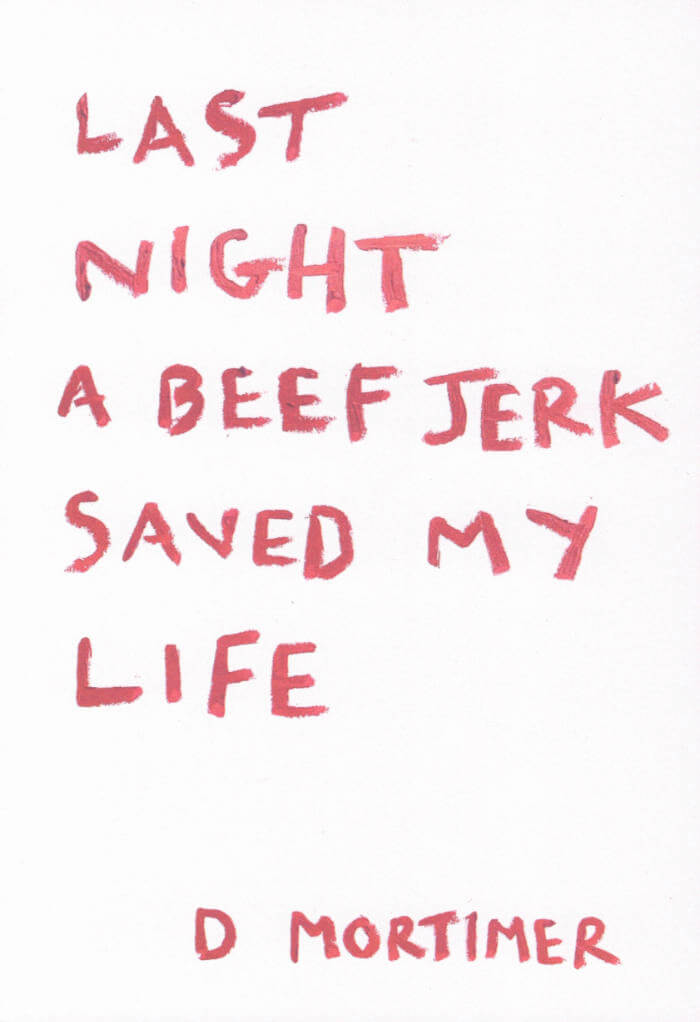
Last Night A Beef Jerk Saved My Life
'Mortimer is one of the most talented writers of our generation and their debut collection proves this. Part essay, part poem, part memoir and part SOS, Last Night a Beef Jerk Saved My Life navigates its thematic scope—ranging from transness, queerness and naming to loving and losing—with sensitivity, insight, humour and bravado. Best thing I read this year.' - Isabel Waidner
'Last Night a Beef Jerk Saved My Life is a wonderful and thoughtful reflection on love and beauty and bodies and music and memories, and on the constellations of small things that make up modern queer life.' - Huw Lemmey
D Mortimer is a writer from London focussed on trans crip narratives. Their work (essays, poetry, prose, creative-criticism) has appeared in Granta and been performed at the Institute of Contemporary Art in London (Queers Read This, The Kathy Acker Reading Group). Their short story ‘Supermarket Revelations’ was published in Liberating the Canon: An Anthology of Innovative Fiction (ed. Waidner, Dostoyevsky Wannabe: 2018) and a poem-essay, 'How To Draw Hands', was published by Warm Yourself by My Trash Fire in 2020.

The Complete Fear of Kathy Acker
Published in excerpts over almost four decades, Jack Skelley’s “secretly legendary” novel is at once an homage to the thrillingly inventive spirit of Kathy Acker’s cut-up novels and a definitive history of LA’s underground culture of the mid-1980s.
Composed in bursts, Fear of Kathy Acker depicts Los Angeles through the eyes of a self-mocking narrator. Shifting styles and personae as he moves between Venice and Torrance, punk clubs and shopping malls, Disneyland and Dodger Stadium, Jack Skelley pushes the limits of language and identity while pursuing–like Kathy Acker–a quixotic literary mix of discipline and anarchy. In this adrenalized, cosmic and comic chronicle of Los Angeles, Skelley's “real life” friends make cameo appearances alongside pop archetypes from Madonna to Billy Idol.
This first-ever complete edition of the book includes new essays, playlists, and a map of the 1980s Los Angeles in which its manic protagonist lives and loves.
Afterword by Sabrina Tarasoff.